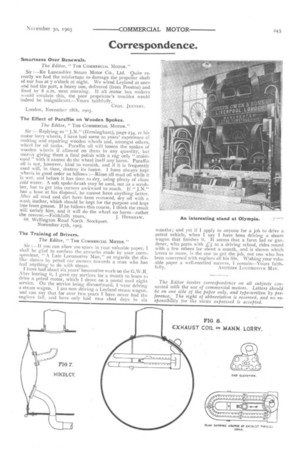Correspondence.
Page 9

If you've noticed an error in this article please click here to report it so we can fix it.
Smartness Over Renewals.
The Editor, "THE COMMERCIAL MOTOR."
Sir :---Re Lancashire Steam Motor Co., Ltd. Quite recently we had the misfortune to damage the propeller shaft of our bus at 7 o'clock at night. We wired Leyland at once and had the part, a heavy one, delivered (from Preston) and lixed by 8 a.m. next morning. If all motor bus makers u (mid emulate this, the poor proprietor's troubles would indeed be insignilicant.—Yours faithfully, Cims. JENNERY.
London, November 28th, 1905.
The Effect of Paraffin on Wooden Spokes.
The Editor, " THE COMMERCIAL MOTOR."
Sir :—Replying to" J.N." (Birmingham), page 234, re his motor lorry wheels, I have had some zo years' experience of making and repairing wooden wheels and, amongst others, wheel for oil tanks. Paraffin oil will loosen the spokes of wooden wheels if allowed on them in any quantity, but niereiy giving them a final polish with a rag only "moistened " with it cannot do the wheel itself any harm. Paraffin oil is not, however, kind to varnish, and if it is frequently used will, in time, destroy its lustre. I have always kept wheels in good order as follows :—Rinse all mud off while it is wet, and before it has time to dry, using plenty of clean cold water. A soft spoke-brush may be used, not as a scrubber, hut to get into corners awkward to reach. If " J.N." has a hose at his disposal, he cannot have anything better. After all mud and dirt have been removed, dry off with a wash leather, which should be kept for the purpose and kept free from grease. If he follows this course, I think the result will satisfy him, and it will do the wheel no harm—rather the reverse.—Faithfully yours, J. HENSHAW. 6g, Wellington Road North. Stockport. November 27th, 1905.
The Training of Drivers.
The Editor, "THE COMMERCIAL MOTOR."
Sir :-11 you can allow me space in your valuable paper, I shall be glad to confirm the remarks made by your correspondent, " A Late Locomotive Man," as regards the dislike shown by petrol car owners towards a man who has had anything to do with steam.
I have had about six years' locomotive work on the G.W.R. After leaving it, I gave my services for a month to learn to drive a petrol motor, which I drove on a postal mail night service. On the service being discontinued, I went driving a steam wagon. 1 am now driving a Leyland steam wagon, 'and can say that for over two years I have never had the engines fail, and have only had two shed days in six
months; and yet if I apply to anyone for a job to drive a petrol vehicle, when I say I have been driving a steam wagon that finishes it. It seems that a farm lad or gardener, who parts with £5 to a driving school, rides round with a few others for about a month, and is shown which levers to move, is the one to get the job, not one who has been concerned with engines all his life. Wishing your valuable paper a well-merited success, I remain—Yours faith fully, ANOTHER LocomoTivx M.
The Editor invites correspondence on all subjects connected with the use of commercial motors. Letters should be on one side of the paper only, and type-written by preference. The right of abbreviation is reserved, and no responsibRity for the views expressed is accepted.
































